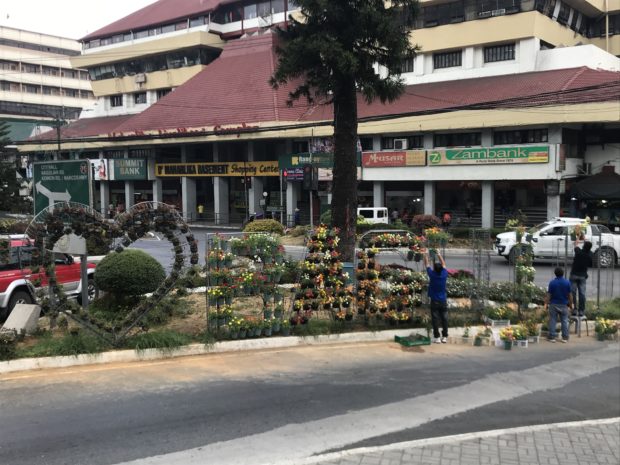Baguio lawmakers chastise livelihood center for not heeding rent holiday ordinance

TRADE CENTER. The Maharlika Livelihood Complex (seen at the backdrop of a Street landscape project) has been criticized for offering rent discounts instead of a rent holiday as imposed by a Baguio ordinance to aid businesses recovering from the coronavirus lockdown. VINCENT CABREZA
BAGUIO CITY –– A livelihood center, put up during Martial Law for vendors displaced by a market fire in the 1970s, was chastised by the City Council on Monday for not heeding a rent holiday imposed by the Baguio government to help small businesses recover from the Luzon lockdown.
Operators of the Maharlika Livelihood Complex informed the council that it could offer its tenants up to 25 percent in discounts on outstanding rent, instead of a full waiver of obligations of enterprises, which were not allowed to operate during the enhanced community quarantine that began in March, as well as the general community quarantine that ended in June.
But Vice Mayor Faustino Olowan reminded Danilo Padua, Maharlika’s project manager, that Ordinance No. 54, series of 2020, applies to all real estate properties and buildings with tenants who were unable to earn for the last five months.
“That ordinance is binding,” he told Padua and Adelaida Cagalingan, president of the Maharlika Livelihood Complex Unified Tenants Association, who were invited to the council’s regular session following numerous complaints lodged by vendors.
Cagalingan said tenants have been negotiating for better terms with Padua since some of them have resumed operations last month.
Opened in 1982 when former First Lady Imelda Marcos served as human settlements minister of the late dictator Ferdinand Marcos, Maharlika had become the foremost supplier of Baguio souvenirs like woodcraft, silverware, and woven garments for nearly half a century.
It is operated by the Human Settlements Development Corporation (HSDC), an attached agency of the Department of Agriculture, which controls the lease until 2025.
DA decided to return Maharlika to the Baguio government this year, and placed the complex under a transition management committee led by Agriculture Secretary William Dar, which set the rent discounts on May 28, Padua informed the council.
Maharlika survives on rent. It generates about P4 million each month to pay its employees and for the building’s maintenance, Padua said.
He did not say how many tenants there were at Maharlika but said the discounts take into account reports that some of the building’s occupants have been subletting stalls for much higher fees.
The Council said it would discuss Maharlika’s policy with Dar.
Maharlika, which lies next to the Baguio public market, was the first interaction of a modern Baguio market building. It was selected as one of the city’s Creative Hub after Baguio joined the Creative Cities network of the United Nations Educational, Scientific, and Cultural Organization in 2017.

GHOST TOWN. Stores of the Maharlika Livelihood Center (In this photos taken in May) were shutdown for months when Luzon was locked down to prevent the spread of the coronavirus disease. Some stores opened in June, but tenants complained when they were asked to pa’t some of their rent. VINCENT CABREZA